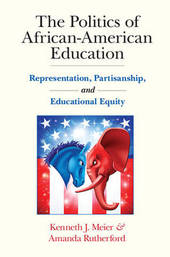
|
The Politics of African-American Education: Representation, Partisanship, and Educational Equity
Hardback
Main Details
| Title |
The Politics of African-American Education: Representation, Partisanship, and Educational Equity
|
| Authors and Contributors |
By (author) Kenneth J. Meier
|
|
By (author) Amanda Rutherford
|
| Physical Properties |
| Format:Hardback | | Pages:264 | | Dimensions(mm): Height 235,Width 157 |
|
| ISBN/Barcode |
9781107105263
|
| Classifications | Dewey:371.82996073 |
|---|
| Audience | | Professional & Vocational | | Tertiary Education (US: College) | |
|---|
| Illustrations |
59 Tables, black and white; 25 Line drawings, black and white
|
|
Publishing Details |
| Publisher |
Cambridge University Press
|
| Imprint |
Cambridge University Press
|
| Publication Date |
24 August 2016 |
| Publication Country |
United Kingdom
|
Description
Based on the 1,800 largest school districts in the United States over a decade, The Politics of African-American Education documents the status of African-American education and the major role that partisanship plays. The book brings together the most comprehensive database on minority education to date that centers around three arguments. First, partisanship permeates African-American education; it affects who is elected to the school board, the racial composition of school administrators and teachers, and the access of African-American students to quality education. Second, African-American representation matters. The effectiveness of African-American representation, however, is enhanced in Democratic districts while representation in Republican districts has little influence. Third, political structures matter, but they are not determinative. Two different structures - election rules and the independent school district - create the rules of the game in US education politics and policy but do not limit others from using those rules to change the outcome.
Author Biography
Kenneth J. Meier is the Charles H. Gregory Chair in Liberal Arts and Distinguished Professor of Political Science at Texas A & M University. He is also a Professor of Public Management at the Cardiff University School of Business. He was formerly the editor-in-chief of the Journal of Public Administration Research and Theory and the editor of the American Journal of Political Science. He is the founding editor of Perspectives on Public Management and Governance. Amanda Rutherford is an assistant professor in the School of Public and Environmental Affairs at Indiana University. She is the book review editor for the Journal of Public Administration Research and Theory and is a member of the Rising Professionals Editorial Board for the Journal of Student Financial Aid. Rutherford's research interests include managerial values and decision making, performance management, organization theory, representative bureaucracy, higher education policy, and research methodology.
Reviews'The deep and broad impact of political party context on local education outcomes for racial minorities, which Meier and Rutherford carefully delineate and document, is striking. This well-crafted and provocative study deserves close attention from scholars, policy makers, and, indeed, all who care about American democracy.' Rodney Hero, University of California, Berkeley 'Looking at the politics of African American education through the analytical lens of partisanship is not only insightful, it is path breaking. Meier and Rutherford enrich our understanding magnificently by going back to the basics of political science. How we organize our collective interests through party affiliation produces clear winners and losers in the classroom.' Luis Ricardo Fraga, Co-Director, Institute for Latino Studies & Arthur Foundation, University of Notre Dame 'Americans traditionally have preferred to think or pretend that race and partisanship both are barred at the schoolhouse door. Employing a range of data, Meier and Rutherford show that's not the case and, indeed, that race and partisanship interact to influence education of African American children in interesting and important ways.' Jeffrey R. Henig, Columbia University, Co-author of The Color of School Reform.
|